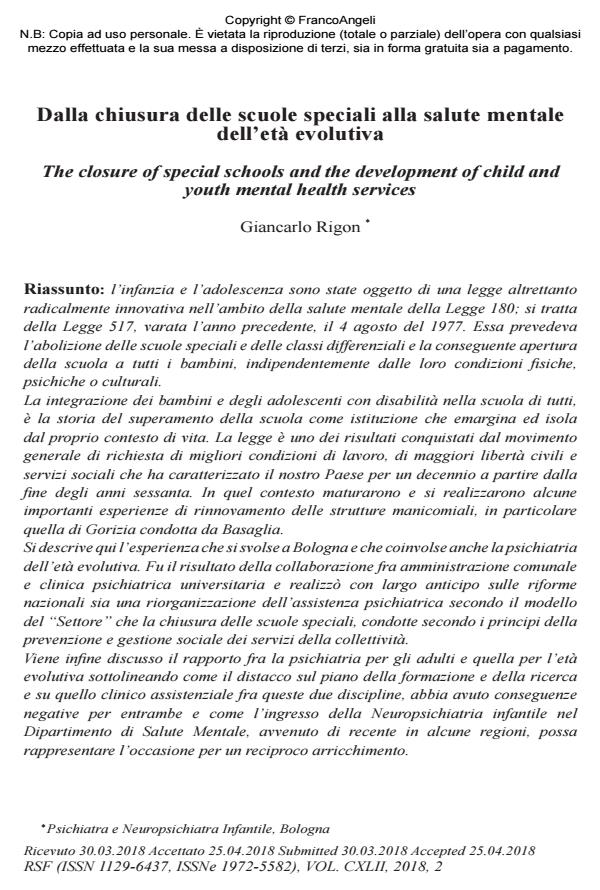The closure of special schools and the development of child and youth mental health services
Journal title RIVISTA SPERIMENTALE DI FRENIATRIA
Author/s Giancarlo Rigon
Publishing Year 2018 Issue 2018/2
Language Italian Pages 16 P. 89-104 File size 1828 KB
DOI 10.3280/RSF2018-002008
DOI is like a bar code for intellectual property: to have more infomation
click here
Below, you can see the article first page
If you want to buy this article in PDF format, you can do it, following the instructions to buy download credits

FrancoAngeli is member of Publishers International Linking Association, Inc (PILA), a not-for-profit association which run the CrossRef service enabling links to and from online scholarly content.
The Law 517, launched in 1977 - one year before the Italian Mental Health Reform (Law 180, 1978) - envisages the closure of special schools and differential classes, thus mainstreaming all children into conventional classrooms, regardless of the youth’s physical, mental or cultural status. In the field of mental health, this law is as radically innovative as the Law 180. The integration of ‘all’ youth and children with disabilities in conventional classrooms, has the key aim of overcoming the school, as an institution, that marginalizes and isolates children from their life context. This law represents one of the outcomes of the general social movement - that lasted in Italy a decade, from the end of the sixties onwards - claiming better working conditions, greater civil liberties and more social services. During this period a few important experiences of deinstitutionalisation of mental hospitals took place, i.e. Basaglia’s endeavours in Gorizia. The author describes what happened in Bologna involving the child and youth mental health service. This experience, fruit of the collaboration between local authorities and the psychiatric Department of the University of Bologna, achieved, well in advance on national reforms, the reorganization of psychiatric care by following the model of "sector psychiatry" and closing the special schools. This process was based on the principles of prevention and community involvement in the management of the services. Concluding, the author analyses the existing separation between the two disciplines of adult and child psychiatry, underlining the negative outcomes in training, research and care. The merging of adult and child psychiatry in the department of mental health - that recently has taken place in certain regions in Italy - represents now an opportunity for the mutual enhancement of both fields.
Keywords: Child and adolescent mental health, special schools, Law 180.
Giancarlo Rigon, Dalla chiusura delle scuole speciali alla salute mentale dell’età evolutiva in "RIVISTA SPERIMENTALE DI FRENIATRIA" 2/2018, pp 89-104, DOI: 10.3280/RSF2018-002008